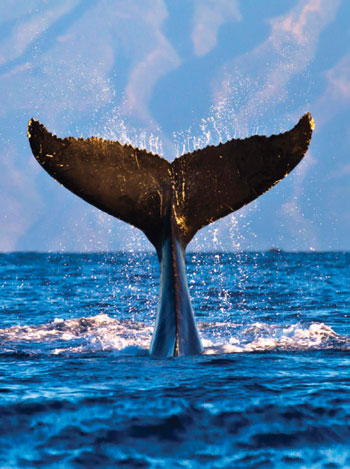Shoppers can help save marine mammals
This article was originally published in March 2014

Consumers can play a role in protecting whales, dolphins and sea lions by choosing American-caught seafood.
To put wild-caught seafood on dinner tables, more than 650,000 marine mammals are killed or seriously injured every year in foreign fisheries after being hooked, entangled or trapped in fishing gear.
Enforcing a U.S. law to protect marine mammals could help prevent tens of thousands of these deaths, according to a new report issued by the Natural Resources Defense Council (NRDC).
The report finds that 91 percent of seafood consumed in the United States is imported and nearly every foreign seafood sold in the United States violates a federal law called the Marine Mammal Protection Act. It requires countries exporting fish products to prove the fish were not caught in violation of U.S. standards that limit serious injury and death of marine mammals.
The wild-caught seafood most consumed by Americans — shrimp, tuna, crab, lobster and salmon — present a particularly significant risk to marine mammals due to the dangerous fishing practices associated with them abroad. Until the United States enforces the law, and countries prove they’re meeting American standards, consumers can play a role in protecting whales, dolphins and sea lions by choosing American-caught seafood.
All shrimp, lobster, crab and salmon sold at PCC is from the United States. We do sell foreign pole-caught skipjack and yellowfin tuna, but the fishing method doesn’t incur bycatch.
Impact on U.S. fishermen
“For 40 years, federal watchdogs have failed to enforce a law that could save thousands of whales and dolphins from negligent foreign fishing practices,” says Zak Smith, attorney with NRDC. “At the same time, U.S. fishermen are being undermined by their own government, which holds them accountable, but not their foreign counterparts.”
“Bycatch isn’t just a moral issue, it’s simple economics,” said Acy Cooper, vice president of the Louisiana Shrimpers Association. “Foreign fishing companies can undercut our prices because they don’t have to invest in ensuring that their exports to the United States were caught in a manner that protects marine mammals.
“Until foreign fleets see real consequences for failing to abide by the law, marine mammals will continue to be harmed around the world and American fishermen will be disadvantaged.”
Advanced gear helps
The key types of fishing gear that threaten marine mammals around the world include gillnets, purse seines, trawls, bottom-set traps and longlines.
There are, however, smart and targeted methods that can be employed to reduce risk and harm to marine mammals from dangerous gear. An aggressive, science-based plan adopted by the United States in 1994 has reduced marine mammal bycatch by nearly 30 percent over 20 years and put special measures in place to save populations at highest risk.
“In many parts of the world, poor fishing practices are driving populations and species of marine mammals to extinction,” said Dr. Andrew J. Read, Stephen Toth Professor of Marine Biology at Duke University.
Upholding standards
In response to petitions and comments filed years ago by NRDC and other environmental groups, the U.S. government began preparing regulations to enforce the law, but has not released them.
Until the U.S. enforces the law, consumers can play a role in protecting marine mammals by purchasing American-caught seafood that abides by U.S. safety standards. Federal law requires seafood be clearly marked with the country of origin.
Fortunately, after years of neglect, the federal government is developing rules to enforce the provision. We need to hold them to it.
Adapted from a press release from the Natural Resources Defense Council.
